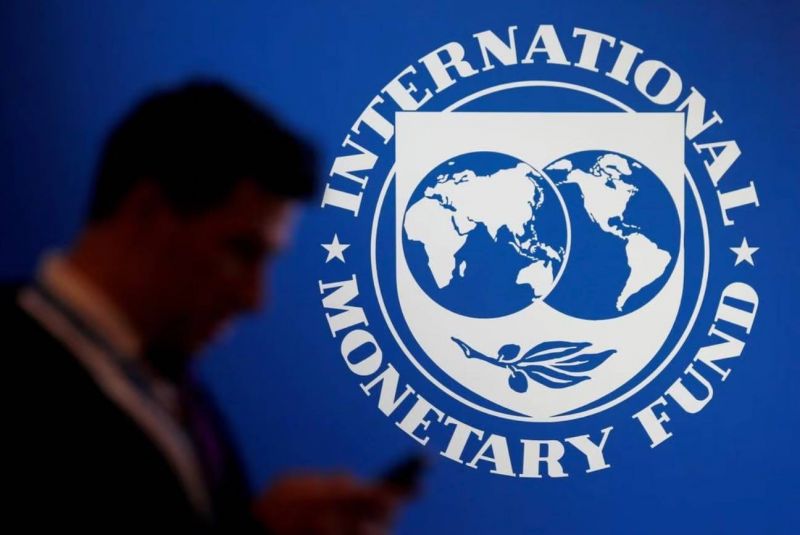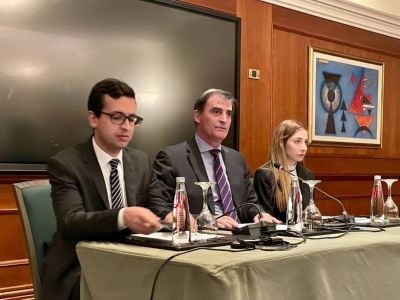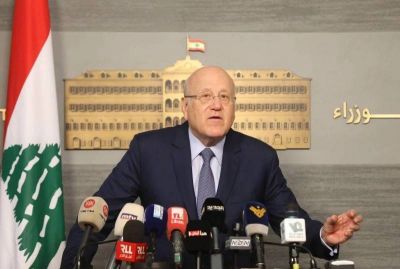
A participant stands near a logo of IMF at the International Monetary Fund - World Bank Annual Meeting 2018 in Nusa Dua, Bali, Indonesia, Oct. 12, 2018. (Credit: Johannes P. Christo/Reuters/File photo)
BEIRUT — The International Monetary Fund (IMF) has once again criticized — in a statement published on Friday — the "lack of action" by Lebanese authorities on "urgently needed reforms" to the economy that would unlock a multibillion-dollar aid package.
IMF mission leader Ramirez Rigo said in the statement that the inaction would have long-lasting repercussions on the Lebanese economy. He praised recent policy decisions by new Banque du Liban interim governor Wassim Manssouri while insisting that "a permanent solution requires comprehensive policy decisions from Parliament and Government."
Rigo's statement comes after a visit to Beirut this week to assess Lebanon's economic situation. He pointed to "an impaired banking sector, inadequate public services, crumbling infrastructure, rising poverty and unemployment rates, and a widening income gap."
"Lebanon has not undertaken the urgently needed reforms, and this will weigh on the economy for years to come," he criticized.
"Inflation remains in triple digits, further compressing real incomes, and foreign exchange reserves continued to decline in the first half of the year," Rigo's statement added.
Tourism a temporary respite
The statement also underlined the "seasonal upturn in tourism, resulting in increased foreign exchange inflows during the summer months." However, Rigo "cautioned against complacency, as this upturn is unlikely to be a lasting trend." He stressed that "tourism and remittances alone cannot offset the considerable trade deficit and the lack of external financing."
He further acknowledged some "positive steps taken by the central bank's new leadership, including the phasing out of the Sayrafa exchange rate platform ... and efforts to halt the depletion of foreign exchange reserves."
Early in September, the government approved replacing BDL's Sayrafa platform with another exchange rate instrument, this one operated by the American financial group Bloomberg LP.
Authorities hope to impose this new platform as the sole reference for the exchange rate between a heavily depreciated Lebanese lira and the dollar, a goal that Sayrafa has never achieved in its three years of existence.
However, Rigo emphasized "the need for comprehensive reforms to enhance the central bank's governance, accounting practices, and foreign exchange operations in line with international standards." He also advocated for the unification of official exchange rates to eliminate arbitrage opportunities that strain public finances."
Fiscal strategy
Rigo emphasized "the government's need to implement a coherent fiscal strategy."
"While some measures have been taken, more needs to be done," he added, insisting that "the 2023 budget, although on time, still falls short in terms of timelines, coverage and accurate reflection of the deficit and associated monetary financing. The 2024 budget should align with the exchange rate unification process, avoid preferential tax treatment, and allocate resources to strengthen the tax administration," he said.
He further called for the establishment of a plan to restructure the banking sector.
"Lebanon has yet to establish a plan for the restructuring of its banking sector," he said, adding that years of inaction on this matter caused "a significant decline in recoverable deposits."
Meanwhile, caretaker Finance Minister Youssef Khalil asserted that "the IMF's statements correspond precisely to the current financial, monetary and economic reality."
"This assessment aligns perfectly with the Ministry of Finance's vision and is consistent with the measures undertaken, as incorporated in the successive budgets for the years 2022, 2023 and 2024," he added. Khalil also said that "observations concerning the need for further reforms confirm the view that what the ministry has done needs to be complemented by urgent structural reforms," lamenting that this is hampered by "the complex political situation."
Since the presidential vacancy began at the end of October 2022, Parliament has met only rarely for legislative sessions, against a backdrop of opposition from certain parties to holding such meetings until a new head of state is elected.

